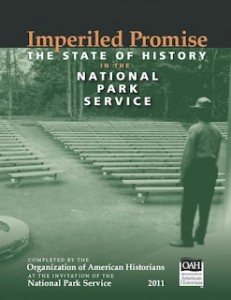Refining the republic: A discussion on history in the National Park Service
08 November 2012 – Melinda Jette
Imperiled Promise, methods, public engagement, scholarship, education, government, profession, employment, training, politics
 Last Friday, November 2, 2012, National Park Service personnel, public historians, academics, and graduate students from the Northeast met at the Massachusetts State Archives in Boston to discuss the Organization of American Historians’ recent report Imperiled Promise: The State of History in the National Park Service (2011). Co-sponsored by the University of Massachusetts History Department and Boston National Historical Park, the “Critical Conversations” on the OAH report were both spirited and timely given the divisiveness of the long presidential campaign and the reverberations of Hurricane Sandy.
Last Friday, November 2, 2012, National Park Service personnel, public historians, academics, and graduate students from the Northeast met at the Massachusetts State Archives in Boston to discuss the Organization of American Historians’ recent report Imperiled Promise: The State of History in the National Park Service (2011). Co-sponsored by the University of Massachusetts History Department and Boston National Historical Park, the “Critical Conversations” on the OAH report were both spirited and timely given the divisiveness of the long presidential campaign and the reverberations of Hurricane Sandy.
As the title of the OAH report suggests, the NPS now sits at crossroads, tasked with preserving, managing, and interpreting hundreds of sites across the United States, yet hampered by structural, financial, and institutional constraints that weaken the practice of history within the agency. This general assessment of the current state of affairs was not a major source of contention in Boston. The discussions focused instead on ways to address four of the twelve findings in the report: the history/interpretation divide, fixed and fearful interpretations, partnerships for history, and civic engagement. Following opening remarks by Professor James Green (UMass Boston) and Superintendent Cassius Cash (Boston National Historical Park), the afternoon consisted of two sessions with panelists from NPS sites and offices in New England and the larger eastern seaboard, including Boston, Lowell, New Bedford, and Gettysburg.
Over the course of lively presentations by the panelists and discussions with the attendees, a recurring concern was how to effect change in the NPS so as to improve the interpretation of history as recommended in the OAH report. A general consensus emerged that improving the practice of history would not only strengthen the NPS, but also help to engage more Americans today. Key issues raised by the panelists and attendees included: the need to reform hiring and training to provide NPS staff with stronger backgrounds in history; the value of allied disciplines (such as anthropology and ethnography); the need for approaches and practices that address controversy in historical interpretation (such as slavery and the Civil War or climate change); how to make new trends in American historiography accessible to the public; the importance of a commitment to diversity in visitor services, community outreach, and the NPS workforce; how to create and sustain partnerships with stakeholders, academics, and public historians; and the need for review of site interpretations (i.e., having American Indian tribes included in the review process). One issue that the “Critical Conversations” alluded to but did not explicitly address was the political hot potato of giving preference to veterans without historical training in the hiring process over applicants with educational credentials in history.
At the close of the afternoon, Marty Blatt (Boston National Historical Park), recalled the vision for the national parks that Frederick Law Olmsted articulated amidst the ruin of the Civil War. Olmsted quoted his fellow landscape architect Andrew Jackson Downing in these words:
“The dread of the ignorant exclusive, who has no faith in the refinement of a republic, will stand abashed in the next century, before a whole people whose system of voluntary education embraces (combined with perfect freedom), not only common schools of rudimentary knowledge, but common enjoyments for all classes in the higher realms of art, letters, science, social recreations, and enjoyments.”
~ Andrew Jackson Downing quoted by Frederick Law Olmsted, “Yosemite and Mariposa Grove: A Preliminary Report”(1865)
This emphasis on the refinement of the republic was a fitting end to an afternoon of lively conversation. Amidst the closing days of the presidential campaign and the distress left behind by Hurricane Sandy, debating the place of history in the national parks might just lead to a stronger agency in service to all those here in the republic: the indigenous, the immigrant, and the native-born.
~ Melinda Marie Jetté is Associate Professor of History and Public History Program Coordinator at Franklin Pierce University in New Hampshire.




It is importnat to note that Olmsted was quoting Andrew Jackson Downing (1815-1852) in the “Yosemite and Mariposa Grove Preliminary Report.” The original text can be found in “Landscape Gardening” , chapter 38, A New York Park
Thanks for clarifying this – we’ve tweaked the text to give Downing the credit along with Olmsted.